zenitylib.yab
A yabasic library (c) Michel Clasquin-Johnson 2018. Licensed accordingto the MIT license
If you are reading this as a man page, be advised that you can see it in glorious HTML, with pictures even, at https://clasqm.github.io/
This library for yabasic allows the use of the Linux command zenity to display a variety of dialogs in graphical mode.
The library will test for the presence of the zenity command and will exit gracefully if it is not present.Zenity is a GTK program, so the colours and styles will follow that of your GNOME defaults. It may also take a moment or two to pop up - there are a lot of libraries to load! If speed is of the essence, stick to the dialog, clasquinator or whiptail libraries.
The entire set of libraries focuses on sane defaults and getting basic functionality into yabasic. There are a lot of options that will not be implemented!
The images below are for illustration only. The exact appearance of the dialogs will depend on your system settings.
Developed on elementary OS 0.4 “Loki” and Lubuntu 18.04 (i.e. Linux), but it should work on any system that will run both yabasic and the zenity command.
The library should exist either in the same folder as your program or in the standard yabasic library location on your system.
To use the library, use the command
import zenitylib
If you would rather cut and paste these subroutines into your own program rather than importing this rather large library, or create your own, smaller library with just the routines you need, be my guest (I would appreciate a note of acknowledgement in your code). But some subroutines require supporting routines that you will find at the end of this library. You will have to include those as well.
You should not use this library and one of the others that provides dialogs in this set concurrently, because they replicate subroutine names. Pick the right one for your program and stick with it!
Routines available:
- Common
- ClearDlg()
- EncloseText$()
- getcmd$()
- InputDlg$()
- MenuDlg()
- MessageDlg()
- PasswordDlg$()
- RadioDlg()
- TestForDialogUtility$()
- TextFileDlg()
- YesNoDlg()
- Specific
- ZCalendarDlg$()
- ZGetDirDlg$()
- ZNotifyDlg()
- ZOpenFileDlg$()
- KSaveFileDlg$()
Common Routines
These routines are available on any of the four dialog-providing libraries.
-
ClearDlg() - on dialog and whiptail, this clears the dialog from your terminal. Same as the yabasic command CLEAR SCREEN, but may work better if you are expecting to issue another Linux command immediately. On zenity and kdialog, dummy routines are provided for compatibility so that you do not need to rewrite your code.
- EncloseText$(thestring$) - A simplified version of the EncloseString$() routine that can be found in the linuxmisclib library
- Encloses a string in double quotes, if it isn’t already.
- Therefore a$ = EncloseText$(“This is text”) gives the same result as a$ = “"This is text"”
- Mostly for use with filenames that may include spaces.
- getcmd$() - returns the command set available.
- This is really just for me, to stop me from getting confused while I am editing four libraries simultaneously.
- However, you could use it to test which utility (or library, in the case of clasquinator) is currently in use and if it is safe to use routines not in the common list.
- e.g, if getcmd$() = “clasquinator” SubmenuDlg(options ….)
- or if getcmd$() = “zenity” ZNotifyDlg(“this is a notification”)
- InputDlg$(text$, title$, ok$, cancel$) - Presents a one-line dialog into which the user can type a string answer.
- The value title$ has no effect in zenity but is kept here for compatibility and must be supplied.
- The value ok$ is the text of the accept button, normally OK.
- The value cancel$ is the text of the reject button, normally Cancel.
- The result is returned as a string value.
- Example:
a$ = InputDlg$(EncloseText$("What is your name?"), EncloseText$("Who are you?"), "Accept", "Cancel")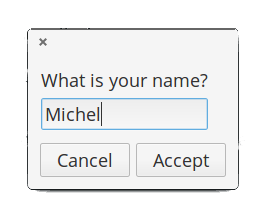
- MenuDlg(text$, title$, ok$, cancel$, menustring$) - Create a menu of options for the user to choose from
- The value title$ has no effect in zenity, but is kept here for compatibility and must be supplied.
- The value ok$ is the text of the accept button, normally OK.
- The value cancel$ is the text of the reject button, normally Cancel.
- The value menustring$ is the list of menu options as a single string, separated by hash signs (#). Spaces are allowed.
- If the number of options exceed the available space in the widget, the list will be scrollable.
- The result is returned as a numeric value, starting from 1.
- The one thing you should be careful not to run from such a menu is … another Yabasic program. + The one thing you should be careful not to run from such a menu is … another Yabasic program. Yabasic has a bug ATM where it will crash any script or menu you try to launch a yabasic app from (at least in Linux). I have reported this, but for now the main demo.bas program is nonfunctional. One way around the problem is to go back to an old 2.79.x version of yabasic, for example my homemade deb here.
- If you prefer to get the same number in string format, you can use MenuDlg$(text$, title$, ok$, cancel$, menustring$)
- Please note that the height of this widget is hardcoded at 400 pixels, because it looked really crap when allowed to autosize. This may change with future releases of zenity.
- EXAMPLE: a = MenuDlg(“This is a menu”, “A Menu!”,”Accept”, “Deny”, “Science#Religion#Magic#All of the above”): print a
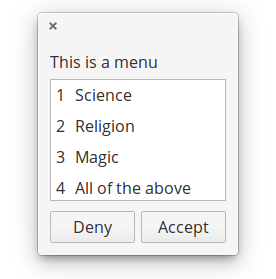
- MessageDlg(text$, ok$) - display a simple message with an OK button.
- Returns nothing.
- Example:
MessageDlg(EncloseText$("This is a simple message dialog. Close it with ENTER or try clicking on OK."),"OK")
- PasswordDlg$(text$, title$, ok$, cancel$) - Same as InputDlg$ but with asterisks replacing the input text.
- The value title$ has no effect in zenity, but is kept here for compatibility and must be supplied.
- The value ok$ is the text of the accept button, normally OK
- The value cancel$ is the text of the reject button, normally Cancel
- The result is returned as a string value.
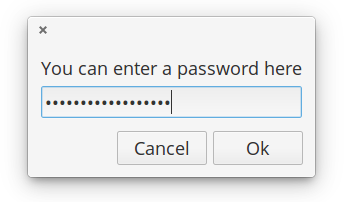
- RadioDlg(text$, title$, ok$, cancel$, menustring$, selected$) - Create a menu of options for the user to choose from
- Same as MenuDlg(), except that radiobuttons are presented in the first column. Unlike the other dialog-creating utilities, you cannot choose which one to pre-select.
- The value title$ has no effect in zenity, but is kept here for compatibility and must be supplied.
- The value ok$ is the text of the accept button, normally OK.
- The value cancel$ is the text of the reject button, normally Cancel.
- The value menustring$ is the list of menu options as a single string, separated by hash signs (#). Spaces are allowed.
- The value selected$ has no effect in zenity, but is kept here for compatibility and must be supplied.
- If the number of options exceed the available space in the widget, the list will be scrollable.
- The result is returned as a numeric value, starting from 1.
- If you prefer to get the same number in string format, you can use RadioDlg$(text$, title$, ok$, cancel$, menustring$, selected$)
- EXAMPLE: a = RadioDlg(“This is a menu”, “A Menu!”,”Accept”, “Deny”, “Science#Religion#Magic#All of the above”, “Magic”): print a
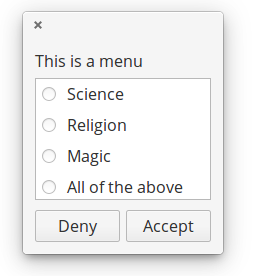
-
TestForDialogUtility$() - Routine to test if the called utility actually exists on the system. An empty string returned means it does, otherwise an error message is returned.
-
TextFileDlg(filename$, title$, exit$) - Displays a text file.
- The value title$ has no effect on zenity, but is used here for compatibility reasons and must be supplied.
- The value exit$ is the title of the button, normally “OK”
- Text wrapping varies from one dialog-provider to the next. It is better if you preformat your text file.
- Returns nothing.
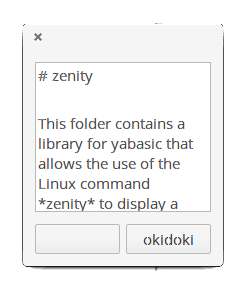
- YesNoDlg(text$,yes$, no$) - Displays a dialog with text (normally a question) and the options to reply yes or no.
- in dialog, the first CAPITAL letter of the yes$ and no$ variables will become the hotkeys for those buttons, so make sure they are different. This does not matter for the other dialog-providing utilities.
- Returns 1 for yes and 0 for no.
- If you would rather get the same result in string format, use YesNoDlg$(text$,yes$, no$)
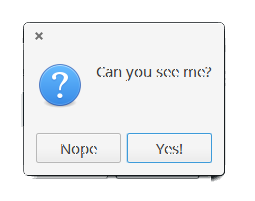
Zenity-specific routines
These routines will only work with zenity, unless specified otherwise.
- ZCalendarDlg$(text$, ok$, cancel$) - Display a calendar widget with today’s date pre-selected.
- Use TAB and SHFT-TAB to move between the fields.
- The value ok$ is the text of the accept button, normally OK.
- The value cancel$ is the text of the reject button, normally Cancel.
- The value text$ has no effect on zenity, but is used here for compatibility reasons and must be supplied.
- On exit, the date is returned in the form dd/mm/yyy, e.g. 23/05/2018
- ONLY available in zenity - for dialog and kdialog, see DCalendarDlg$() and KCalendarDlg$()
- DCalendarDlg$ and ZCalendarDlg$ are fully compatible.
- EXAMPLE: print ZCalendarDlg$(“"Pick a date"”, “Pick”, “Escape”)
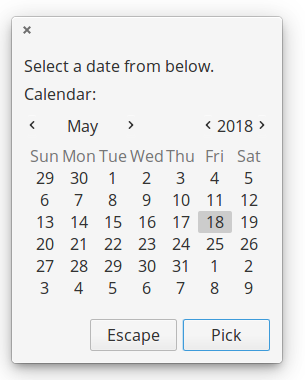
- ZGetDirDlg$() - Select a directory to open.
- Result is returned as a string value.
- This value is probably terminated with a linefeed - use StripLFoffSysCmd$() in the linuxmisc library to get rid of it.
- Also, once you have it you will want to use EncloseText() to surround it with double quotes, just in case it has spaces in it.
- ONLY available in zenity, but kdialog has a comparable set of commands.
- For an alternative approach, see SelectDir$() in the linuxmisclib library.
- ZNotifyDlg(text$) - pop up a GTK notification.
- The exact placement and duration of notifications may depend on your WM settings.
- ONLY available in Zenity. If you need a general utility, try NotifyDlg() in the linuxmisclib library.
- ZOpenFileDlg$() - Select a file to open.
- Result is returned as a string value.
- This value is probably terminated with a linefeed - use StripLFoffSysCmd$() in the linuxmisc library to get rid of it.
- Also, once you have it you will want to use EncloseText() to surround it with double quotes, just in case it has spaces in it.
- ONLY available in zenity, but kdialog has a comparable set of commands.
- For an alternative approach, see SelectFile$() in the linuxmisclib library.
- Example:
a$ = StripLFoffSysCmd$(ZSaveFileDlg$())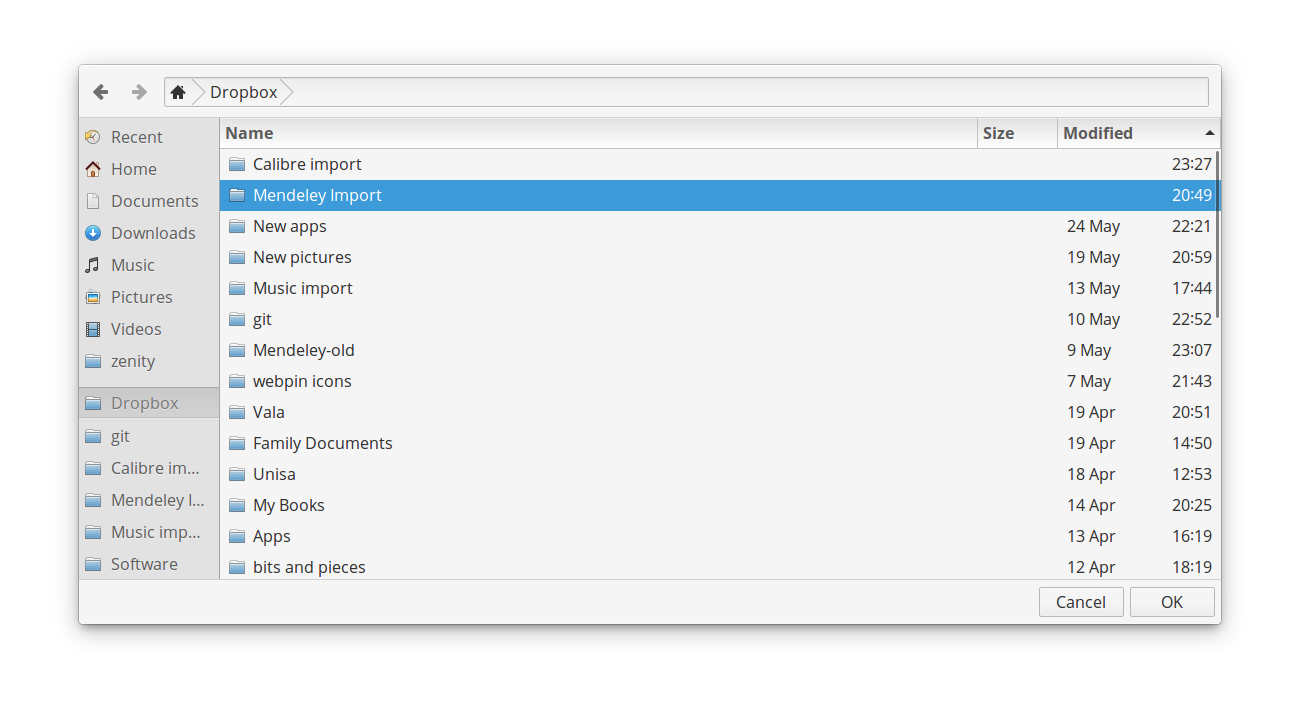
- ZSaveFileDlg$() - Select or create a file to save.
- Result is returned as a string value.
- This value is probably terminated with a linefeed - use StripLFoffSysCmd$() in the linuxmisc library to get rid of it.
- Also, once you have it you will want to use EncloseText() to surround it with double quotes, just in case it has spaces in it.
- ONLY available in zenity, but kdialog has a comparable set of commands.